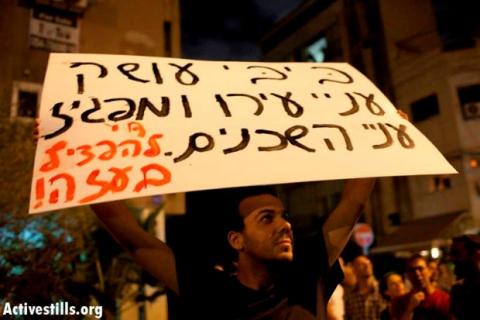Submitted by ICConline on
In the article on the ‘social justice’ movement in Israel we published on 7 August [1], we wrote that “numerous demonstrators have expressed their frustration with the way the incessant refrain of ‘security’ and of the ‘threat of terrorism’ is used to make people put up with growing economic and social misery. Some have openly warned of the danger that the government could provoke military clashes or even a new war to restore ‘national unity’ and split the protest movement”.
These fears proved to be well-grounded. On 18 August, there was a spate of armed attacks on Israeli civilians and military patrols. Two public transport buses in southern Israel were raked with gunfire, leaving several dead and wounded. There was some confusion as to whether the Popular Resistance Committees or Hamas carried out these attacks: neither claimed responsibility. Either way, the Israeli government responded in its characteristically brutal manner, with air strikes in Gaza that killed members of the PRC but also children and a group of Egyptian border guards. This in turn provoked further rocket attacks launched from Gaza on southern Israeli towns.
Whoever initiated this latest spiral of violence, an increase in war tensions can only benefit the nationalists on both sides of the Israel-Arab conflict. It will create major difficulties for the development of the protest movement and will make many hesitate about continuing with the tent cities and demonstrations at a time when there is enormous pressure to maintain ‘national unity’. Calls to cancel the protests came from the like of National Union of Students leader Itzik Shmuli, but a significant core of the protestors rejected this call. On the night of Saturday 20 August demonstrations went ahead although they were to be ‘muted’, and were on a far smaller scale than in previous weeks. The same was true for the demonstrations on Saturday 27 August.
And yet what is significant is that these demonstrations did take place, attracting up to 10,000 in Tel Aviv and several thousand in other cities. And there was no shying away from the question of war: on the contrary, the slogans raised on the demos reflected a growing understanding of the need to resist the march to war and for the oppressed of both sides to fight for their common interests: “Jews and Arabs refuse to be enemies”, “social justice is demanded in Israel and the territories”, “Life in dignity in Gaza and Ashdod”; “No to another war which will bury the protest”. The “Tent 1948” Palestinian-Jewish group on Rothschild Boulevard issued a statement of its own: “This is the time to show real strength”, the statement read. “Stay on the streets, condemn the violence and refuse go either home or to the Army to take part in the revenge attack on Gaza.”
A speech by Raja Za’atari in Haifa also expressed the emergence of internationalist sentiments, even if still couched in the language of democracy and pacifism: “At the end of the day, a homeless family is a homeless family, and a hungry child is a hungry child, regardless whether he speaks Arabic, Hebrew, Amharic or Russian. At the end of the day, hunger and humiliation, just like wealth, have no homeland and no language… We are saying: it is time to speak of peace and justice in one breath! Today more than ever, it is obvious to everyone that in order to curb talk of justice, this government might begin another war”. onedemocracy.co.uk/news/we-will-be-a-jewish-arab-people
The fact that these slogans and sentiments should become so much more popular than they were only a year or two ago indicates that something profound is happening in Israel, and especially among the younger generation. We have seen comparable glimmerings of youthful protest against the Islamic status quo in Gaza[2].
As in Israel, the ‘Gaza youth’ are a small minority and they are weighed down with all kinds of illusions – in particular, Palestinian nationalism. But in a global context of mounting revolt against the existing order, the foundations are being laid for the development of a genuine internationalism based on the class struggle and the perspective of an authentic revolution of the exploited.
Amos 28/8/11
-
In a further sign that the protests in Israel have not disappeared, The Guardian of 28 August reported that a number of unoccupied buildings in Jerusalem have been taken over by demonstrators who are demanding that they be used to house people at affordable rents. www.theguardian.com/world/2011/aug/28/israel-squatting-campaign-housing







 del.icio.us
del.icio.us Digg
Digg Newskicks
Newskicks Ping This!
Ping This! Favorite on Technorati
Favorite on Technorati Blinklist
Blinklist Furl
Furl Mister Wong
Mister Wong Mixx
Mixx Newsvine
Newsvine StumbleUpon
StumbleUpon Viadeo
Viadeo Icerocket
Icerocket Yahoo
Yahoo identi.ca
identi.ca Google+
Google+ Reddit
Reddit SlashDot
SlashDot Twitter
Twitter Box
Box Diigo
Diigo Facebook
Facebook Google
Google LinkedIn
LinkedIn MySpace
MySpace